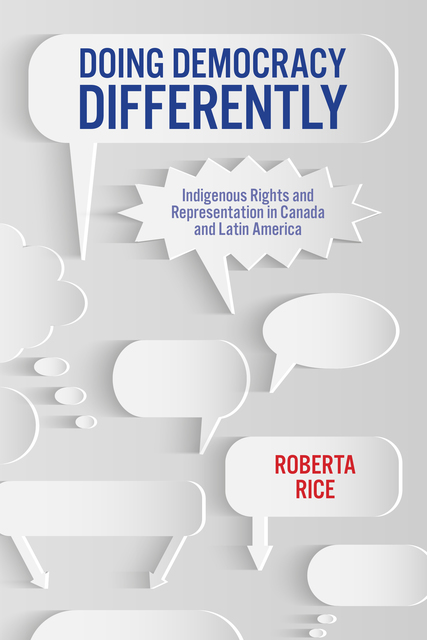Doing Democracy Differently
Indigenous Rights and Representation in Canada and Latin America
A comparative study of innovative approaches to Indigenous self-government.
Across North and South America, Indigenous people play a dual political role, building self-governing structures in their own nations and participating in the elections of settler states. Doing Democracy Differently asks how states are responding to demands for Indigenous representation and autonomy and in what ways the ongoing project of decolonization may unsettle the practice of democracy.
Based on the structured, focused comparison of four success stories across Northern Canada, Bolivia, and Ecuador, this book provides real-world examples of how Indigenous autonomy and self-determination may be successfully advanced using existing democratic mechanisms. Drawing on thorough original research to identify factors that create distinctive patterns within Indigenous-state relations, it argues that the capacity for democratic innovation lies within the realm of civil society while the possibility for uptake of such innovation is found within the state and its willingness to work with Indigenous and popular actors.
Operating at the intersection of Indigenous and Comparative Politics, Doing Democracy Differently takes seriously the role of institutions and the land on which they are built in the creation of democratic transformations in the Americas. This book advances Indigenous rights to autonomy and self-government and speaks to some of the thorniest issues in democratic governance.
Resources
Resource Collections
Download by Chapter
Collection
Single Resources
PDF PDF Conclusion: Instituting Indigenous and Democratic Governance Innovations
PDF Chapter 5. Ecuador: Promoting Plurinationality through Local Indigenous Governments
PDF Chapter 4. Nunavut: Enacting Public Government as Indigenous Self-Government
PDF Chapter 3. Bolivia: Advancing Indigenous Governance as a Distinct Order of Government
PDF Chapter 2. Yukon: Leading the World in a Nation-to-Nation Indigenous Self-Government
PDF Chapter 1. Decolonizing Democracy: Theoretical and Conceptual Considerations
PDF Introduction: Re-envisioning Democracy at the Intersection of Comparative and Indigenous Political Inquiry
PDF Front Matter
PDF Doing Democracy Differently - Complete Text
Metadata
- isbn978-1-77385-565-3
- issn2561-3065
- publisherUniversity of Calgary Press
- publisher placeCalgary, AB
- restrictionsCC BY-NC-ND 4.0
- rightsThis Open Access work is published under a Creative Commons licence.
- series number4
- series titleGlobal Indigenous Issues

